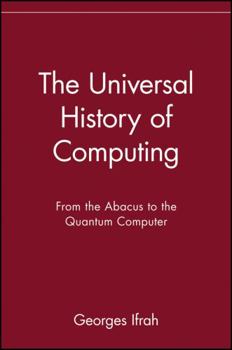The Universal History of Computing: From the Abacus to the Quantum Computer
Select Format
Select Condition 
Book Overview
"A fascinating compendium of information about writing systems-both for words and numbers." "A truly enlightening and fascinating study for the mathematically oriented reader." "Well researched. . . . This book is a rich resource for those involved in researching the history of computers." In this brilliant follow-up to his landmark international bestseller, The Universal...
-Publishers Weekly
-Booklist
-The Mathematics Teacher
Format:Paperback
Language:English
ISBN:0471441473
ISBN13:9780471441472
Release Date:December 2001
Publisher:Wiley
Length:416 Pages
Weight:1.15 lbs.
Dimensions:1.0" x 6.0" x 8.8"
Customer Reviews
4 ratings
Simply A Must Read!
Published by Thriftbooks.com User , 15 years ago
This is simply a must read for anyone who is interested in numerical literacy! Indispensable and should be required curriculum for anyone who teaches who wishes to think of themselves as versed in the arts and letters.
A Philosophical Approach
Published by Thriftbooks.com User , 17 years ago
If you have been looking for a more academic approach to the history of computing then this is the book for you. The book is divided into three parts. Part One contains a very comprehensive taxonomy/chronology showing the evolution of human number systems. Part Two is where you will find the core "History of Computing" bit: tables, logarithms, analogue/digital, mechanical calculators, automatic calculation, electronic machines etc. It also includes an interleaved, and detailed, explanation of how computing has evolved from basic number crunching into abstract information processing. Part Three reads like a long philosophical conclusion and contains some excellent material on ethics and artificial intelligence.
It starts with the development of efficient notation
Published by Thriftbooks.com User , 20 years ago
Until recently, the history of computing has tended to be tied to the goals of mathematicians, as they struggled to keep up with the increasing demands of a society growing more technical. As nations began to trade with other nations, the necessity of performing computations on larger numbers very quickly forced changes in the notation. When first introduced into Europe, the modern decimal system of notation was greeted with skepticism and some hostility. However, as is nearly always the case in human endeavors, it was accepted rather quickly, as it was so much more efficient than other systems such as Roman numerals. Therefore, the history of computing devices is bound very tightly with improvements in representation, and the historical changes in notation are the topic of the first section of the book. Ifrah does an excellent job in recapitulating the history of the notation of computation, covering the entire world, ending up with the modern notation and the efficiency of binary numbers. Nearly forty pages are devoted to explanations of many ancient numerical notations, and many figures are included. It is this approach that differentiates this book from other histories of computing. Other authors concentrate on the history of the evolving architectures of the computing devices, ignoring the necessary precondition of a compact and efficient notation. It is very difficult to imagine computing devices that could easily perform arithmetic on Roman numerals. The second section is a two track treatment of the development of computing devices. One track covers the mathematical preliminaries and the second the mechanical advances that led to the construction of accurate computers. Most of the early improvements were done by mathematicians, and it was not until the late nineteenth century that governments started to be interested in computers. The primary event was the work of Charles Babbage, who showed that computers were possible and how valuable they could be in performing routine computations that were highly prone to error. In many ways, this history of computing is more a history of the requisite mathematics rather than a history of hardware. This is a second way in which this book differs from other histories. One of the reasons why computers have improved so quickly is that much of the theoretical background for their actions were developed before the machines were. Ifrah explains that in great detail, describing how some of the principles of abstract mathematics have been applied to the building of computers. The final section is very small and deals with the future of computing. This is a wise move, as this book is a history and one thing we have learned from the recent history of computers is that predicting the future is largely impossible. We know that they will get faster, have more memory and the usage will increase, but the consequences of this are difficult to predict. If your interest is in the preconditions necessary for comput
The Universal History of Computing : From the Abacus to
Published by Thriftbooks.com User , 22 years ago
This book is really fascinating, especially if you are interested in scientific and technical achievements. Read this book and you'll find out how the computer can be traced to the Renaissance, and how Word War II influenced the development of analytical calculation. The epic tale of computing comes to life in these pages.





